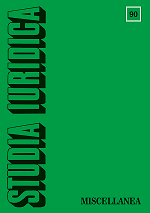Work as care, care as work: The contribution of Eva Feder
Kittay and Sibyl A. Schwarzenbach to the understanding of work’s value
Work as care, care as work: The contribution of Eva Feder
Kittay and Sibyl A. Schwarzenbach to the understanding of work’s value
Author(s): Katarzyna SzymalaSubject(s): Politics / Political Sciences, Law, Constitution, Jurisprudence
Published by: Wydawnictwa Uniwersytetu Warszawskiego
Keywords: care; care ethics; work; labor; fragility; dependence; precariat; troska; etyka troski; praca; zatrudnienie; kruchość; zależność; prekariat
Summary/Abstract: In this paper I attempt to reveal a woman’s intuition in understanding the value of labor (considered as satisfying one’s bodily needs). My central idea is that it has much to do with the notion of care and that care ethics contributes to the comprehension of the concept of labor and every work in general.The starting point is an overview oftwo different perspectives on labor: understanding work as care and care as work. The first approach is represented by Sibyl A. Schwarzenbach and her idea of “ethical reproduction” (or “reproductive labor”) which aims to fulfil one’s needs or to create relationships based on friendship. The second approach is that of Eva Feder Kittay who advocates the need and social and political convenience of considering care as work, with all its intrinsic characteristics.Both feminist philosophers go beyond the liberal notion of work as ownership relation (Locke) and the neoliberal productive assumption of work as a domain of power and productive capacity. Strongly convinced of the existence of profound social interdependency, Feder Kittay and Schwarzenbach emphasize the importance of dealing with human fragility in and through work and of fostering friendly relations.Our contemporary society is a “society of tiredness” and of burnout professionals (Byng-Chul) but still a precarious community (Standing), marked by the existence of those uncared for, whose present and future labor is uncertain. We need a balanced view on work, a voice combining common sense and humanistic vision. A woman’s voice, a different voice (Gilligan) can serve as a meaningful framework to create more true-to-life public policies regarding work and more adequate social patterns to approach this issue. Work understood as labor (Arendt) may consequently be rediscovered and given its proper value.My aim here is not to give a detailed explanation of the ideas mentioned above but rather to introduce into public debate the consideration of care as an inherent mark of each work.
Journal: Studia Iuridica
- Issue Year: 2021
- Issue No: 90
- Page Range: 174-184
- Page Count: 11
- Language: English

